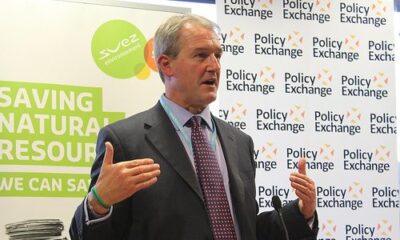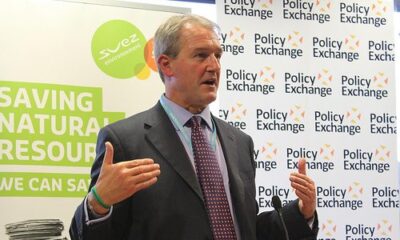

Energy
Exposed: ‘Academics-For-Hire Agree Not To Disclose Fossil Fuel Funding’
A Greenpeace undercover investigation has exposed how fossil fuel companies can secretly pay academics at leading American universities to write research that sows doubt about climate science and promotes the companies’ commercial interests.
Posing as representatives of oil and coal companies, reporters from Greenpeace UK asked academics from Princeton and Penn State to write papers promoting the benefits of CO2 and the use of coal in developing countries.
The Professors agreed to write the reports and said they did not need to disclose the source of the funding.
Citing industry-funded documents – including testimony to state hearings and newspaper articles – Professor Frank Clemente of Penn State said: “In none of these cases is the sponsor identified. All my work is published as an independent scholar.”
The leading climate-sceptic academic, Professor William Happer, agreed to write a report for a Middle Eastern oil company and to allow the firm to keep the source of the funding secret.
Happer is due to appear this afternoon as a star witness in US Senate hearings called by Republican Presidential candidate Ted Cruz.
In emails to reporters he also revealed Peabody energy paid thousands of dollars for him to testify at a separate state hearing, with the money going to a climate-sceptic think-tank.
The investigation also found:
– US coal giant Peabody Energy paid tens of thousands of dollars to an academic who produced coal-friendly research and provided testimony at state and federal climate hearings, the amount of which was never revealed.
– The Donors Trust, an organisation that has been described as the “dark money ATM” of the US conservative movement, confirmed in a taped conversation with an undercover reporter that it could anonymously channel money from a Middle Eastern oil and gas company to US climate sceptic organisations.
– Princeton professor William Happer laid out details of an unofficial peer review process run by the Global Warming Policy Foundation (GWPF), a UK climate sceptic think tank, and said he could ask to put an oil funded report through a similar review process after admitting that it would struggle to be published in an academic journal.
– A recent report by the GWPF that had been through the same unofficial review process, was promoted as “thoroughly peer-reviewed” by influential columnist Matt Ridley – a senior figure in the organisation.
The full story and all the documents have been published on http://energydesk.greenpeace.org/
The findings echo the case of Willie Soon, a prominent academic exposed in a New York Times investigation as having accepted donations from fossil fuel companies and anonymous donors in return for producing climate-sceptic scientific papers.
Reporters approached the academics claiming to be representatives of unnamed fossil fuel companies looking to commission ‘independent’ research.
Professor Frank Clemente, a sociologist from Penn State university, was asked if he could produce a report “to counter damaging research linking coal to premature deaths (in particular the WHO’s figure that 3.7 million people die per year from fossil fuel pollution)”. He said that this was within his skill set; that he could be quoted using his university job title; and that it would cost around $15,000 for an 8-10 page paper
Asked whether he would need to declare the source of the money, Professor Clemente said: “There is no requirement to declare source funding in the US.” He then shared examples of a testimony and an op-ed, explaining: “Note that in none of these cases is the sponsor identified. All my work is published as an independent scholar.”
Clemente also disclosed that for another report on “the Global Value of Coal” he was paid $50,000 by Peabody Energy – the sponsorship was mentioned in the small print of the paper, but the amount has not been disclosed until now.
The academics’ willingness to conceal the source of funding contrasts strongly with the ethics of journals such as Science, which states in its submission requirements that research “should be accompanied by clear disclosures from all authors of their affiliations, funding sources, or financial holdings that might raise questions about possible sources of bias”
The investigation has also revealed a system by which foreign oil and gas companies can anonymously fund US climate-sceptic scientists and organisations.
When asked to ensure that the commissioning of the report could not be traced back to the Middle East oil and gas company, Professor Happer contacted his fellow CO2 Coalition board member, Bill O’Keefe, a former Exxon lobbyist. He suggested channelling it through the Donors Trust, a controversial organisation that has previously been called the “Dark Money ATM” of the US conservative movement.
When investigators asked Peter Lipsett of the Donors Trust, if the Trust would accept money from an oil and gas company based in the Middle East, he replied that, although the Trust would like the cash to come from a US bank account, “we can take it from a foreign body, just we have to be extra cautious with that.”
Professor Happer, who sits on the GWPF’s Academic Advisory Council, was also asked by undercover reporters if he could put the industry-funded report through the same peer review process as previous GWPF reports claimed to have been “thoroughly peer reviewed”. Happer explained that this process had consisted of members of the Advisory Council and other selected scientists reviewing the work, rather than presenting it to an academic journal.
He added: “I would be glad to ask for a similar review for the first drafts of anything I write for your client. Unless we decide to submit the piece to a regular journal, with all the complications of delay, possibly quixotic editors and reviewers that is the best we can do, and I think it would be fine to call it a peer review.
GWPF’s “peer review” process was used for a recent GWPF report on the benefits of carbon dioxide. According to Dr Indur Goklany, the author of the report, he was initially encouraged to write it by the journalist Matt Ridley, who is also a GWPF academic advisor. That report was then promoted by Ridley, who claimed in his Times column that the paper had been “thoroughly peer reviewed”.
Commenting on the investigation, Greenpeace UK executive director John Sauven said: “This investigation exposes a network of academics-for-hire and a back channel that lets fossil fuel companies secretly influence the climate debate while keeping their fingerprints off. Our research reveals that professors at prestigious universities can be sponsored by foreign fossil fuel companies to write reports that sow doubt about climate change, and that those professors will keep that funding secret from the public.
“The question now is very simple. Down the years, how many scientific reports that sowed public doubt on climate change were actually funded by oil, coal and gas companies? This investigation shows how they do it, now we need to know when and where they did it. It’s time for the sceptics to come clean.”
He added: “Lord Lawson’s Global Warming Policy Foundation (GWPF) has serious questions to answer. Does it condone a member of its academic council agreeing to be secretly sponsored to write a report by a group purporting to be from a Middle Eastern oil company? Have reports by senior figures in Lawson’s foundation been secretly paid for by the fossil fuel industry?
“Would they have agreed to Professor Happer’s suggestion that the ‘oil-funded’ report be put through a ‘similar review’ process to the GWPF’s own ‘peer-review’ process? Does it accept that the foundation’s so-called ‘peer review’ process is flawed, given Professor Happer’s revelations about how it operated on an earlier report? And does the foundation stand by its academic advisor, Viscount Ridley, who described that earlier report as ‘thoroughly peer-reviewed’?”


 Environment12 months ago
Environment12 months agoAre Polymer Banknotes: an Eco-Friendly Trend or a Groundswell?

 Features11 months ago
Features11 months agoEco-Friendly Cryptocurrencies: Sustainable Investment Choices

 Features12 months ago
Features12 months agoEco-Friendly Crypto Traders Must Find the Right Exchange

 Energy11 months ago
Energy11 months agoThe Growing Role of Solar Panels in Ireland’s Energy Future





























